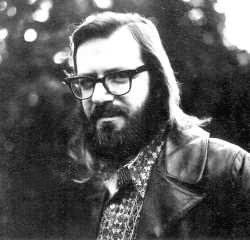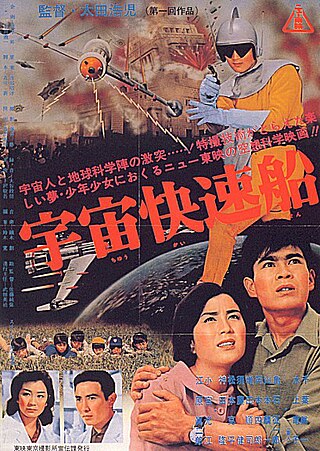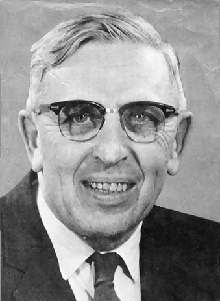External links
- Invasion from 2500 title listing at the Internet Speculative Fiction Database
Invasion from 2500 is a science fiction novel by American writers Ted White and Terry Carr in 1964 under the pseudonym Norman Edwards. It was published by Monarch Books in August 1964. [1] [2]

Mars, the fourth planet from the Sun, has appeared as a setting in works of fiction since at least the mid-1600s. Trends in the planet's portrayal have largely been influenced by advances in planetary science. It became the most popular celestial object in fiction in the late 1800s, when it became clear that there was no life on the Moon. The predominant genre depicting Mars at the time was utopian fiction. Around the same time, the mistaken belief that there are canals on Mars emerged and made its way into fiction, popularized by Percival Lowell's speculations of an ancient civilization having constructed them. The War of the Worlds, H. G. Wells's novel about an alien invasion of Earth by sinister Martians, was published in 1897 and went on to have a major influence on the science fiction genre.

Murray Leinster was a pen name of William Fitzgerald Jenkins, an American writer of genre fiction, particularly of science fiction. He wrote and published more than 1,500 short stories and articles, 14 movie scripts, and hundreds of radio scripts and television plays.
Science fiction comedy or comic science fiction is a subgenre of science fiction or science fantasy that exploits the science fiction genre's conventions for comedic effect. Comic science fiction often mocks or satirizes standard science fiction conventions, concepts and tropes – such as alien invasion of Earth, interstellar travel, or futuristic technology. It can also satirize and criticize present-day society.

Alien invasion or space invasion is a common feature in science fiction stories and film, in which extraterrestrial lifeforms invade the Earth to exterminate and supplant human life, enslave it, harvest people for food, steal the planet's resources, or destroy the planet altogether. It can be considered as a science-fiction subgenre of the invasion literature, expanded by H. G. Wells's seminal alien invasion novel The War of the Worlds.
Science fiction is a film genre that uses speculative, fictional science-based depictions of phenomena that are not fully accepted by mainstream science, such as extraterrestrial lifeforms, spacecraft, robots, cyborgs, mutants, interstellar travel, time travel, or other technologies. Science fiction films have often been used to focus on political or social issues, and to explore philosophical issues like the human condition.

La Planète des singes, known in English as Planet of the Apes in the US and Monkey Planet in the UK, is a 1963 science fiction novel by French author Pierre Boulle. It was adapted into the 1968 film Planet of the Apes, launching the Planet of the Apes media franchise.

David Arthur Whitaker was an English television writer and novelist who worked on the early years of the science-fiction TV series Doctor Who. He served as the programme's first story editor, supervising the writing of its first 51 episodes from 1963 to 1964.

Terry Gene Carr was an American science fiction fan, author, editor, and writing instructor.
Walter Braden "Jack" Finney was an American writer. His best-known works are science fiction and thrillers, including The Body Snatchers and Time and Again. The former was the basis for the 1956 film Invasion of the Body Snatchers and its remakes.

Theodore Edwin White is a Hugo Award-winning American science fiction writer, editor and fan, as well as a music critic. He writes and edits as Ted White. In addition to books and stories written under his own name, he has also co-authored novels with Dave van Arnam as Ron Archer, and with Terry Carr as Norman Edwards.

Veronica Cartwright is a British-born American actress. She is known for appearing in science fiction and horror films, and has earned numerous accolades, including three Primetime Emmy Award nominations. Her younger sister is actress Angela Cartwright.
Richard M. Powers was an American science fiction and fantasy fiction illustrator. He was inducted into the Science Fiction Hall of Fame in 2008 and the Society of Illustrators Hall of Fame in 2016.

An extraterrestrial or alien is any extraterrestrial lifeform: a lifeform that did not originate on Earth. The word extraterrestrial means "outside Earth". The first published use of extraterrestrial as a noun occurred in 1956, during the Golden Age of Science Fiction.

Invasion of the Neptune Men is a 1961 superhero film produced by Toei Company Ltd. The film stars Sonny Chiba as Iron Sharp.

Many works of fiction have featured UFOs. In most cases, as the fictional story progresses, the Earth is being invaded by hostile alien forces from outer space, usually from Mars, as depicted in early science fiction, or the people are being destroyed by alien forces, as depicted in the film Independence Day. Some fictional UFO encounters may be based on real UFO reports, such as Night Skies. Night Skies is based on the 1997 Phoenix UFO Incident.
Dudley George Simpson was an Australian composer and conductor. He was the Principal Conductor of the Royal Opera House orchestra for three years and worked as a composer on British television. He worked on the BBC science-fiction series Doctor Who, for which he composed incidental music during the 1960s and 1970s. When Simpson died aged 95 in 2017, The Guardian wrote that he was "at his most prolific as the creator of incidental music for Doctor Who in the 1960s and 1970s, contributing to 62 stories over almost 300 episodes – more than any other composer."
Complete Review is a literary website founded in March 1999. It is best known for reviews of novels in English translation, in particular drawing attention to otherwise neglected contemporary works from around the world, but there are also reviews of classics, non-fiction, drama and poetry. As of March 2009, on its tenth anniversary, there were a total of 2251 works under review, averaging over 250 new reviews added per year. A blog, Literary Saloon, was added in August 2002.

The War of the Worlds is a science fiction novel by English author H. G. Wells. It was written between 1895 and 1897, and serialised in Pearson's Magazine in the UK and Cosmopolitan magazine in the US in 1897. The full novel was first published in hardcover in 1898 by William Heinemann. The War of the Worlds is one of the earliest stories to detail a conflict between humankind and an extraterrestrial race. The novel is the first-person narrative of an unnamed protagonist in Surrey and his younger brother in London as southern England is invaded by Martians. It is one of the most commented-on works in the science fiction canon.

Clifford Donald Simak was an American science fiction writer. He won three Hugo Awards and one Nebula Award. The Science Fiction Writers of America made him its third SFWA Grand Master, and the Horror Writers Association made him one of three inaugural winners of the Bram Stoker Award for Lifetime Achievement. He is associated with the pastoral science fiction subgenre.
John Hayden Howard (1925-2014) was an American educator, poet and science fiction author. He used the pen name Hayden Howard.